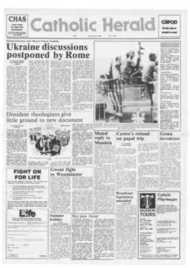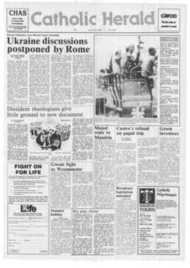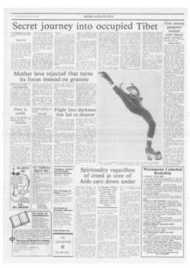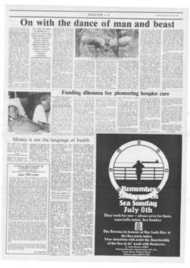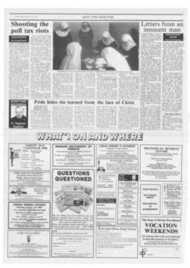Page 6, 6th July 1990
Page 6

Report an error
Noticed an error on this page?If you've noticed an error in this article please click here to report it.
Tags
Share
Related articles
End Racism Congress Demands
Anglicans Must Await Rome's Decision 'keep Racists Out'...
By Cristina Odone
Liverpool Hears Of Racism
Africa: Malaise Behind Growing Church Figures
Answering Rome's call for an end to racism
Black Catholics are to meet next weekend to discuss their isolation in the church in this country. Timothy Elphick reports.
NEXT weekend more than 200 Asians, African and Caribbean Catholics will gather in south west London to debate the problems encountered by blacks within the church.
The Congress of Black Catholics, to be held at Digby Stuart College, Roehampton, aims to find ways of redressing the balance in the church which has until now left black Catholics out in the cold. A charter for action will be drawn up to help point the way forward towards a truly universal church — an umbrella organisation meeting the needs of peoples from different cultures.
Anthony Lobo, chair of the Catholic Association for Racial Justice, which is organising the conference,believes that the Catholic church in Britain has failed adequately to recognise the presence of 250,000 members of ethnic origin in its midst. He asks why, when blacks in the community at large are doing well in many walks of life, so few can be seen in the service of the church.
"We are still kept very much on the doorstep," Mr Lobo says. "We must look to the future of the church and the reasons for there being not one ordination from among Britishborn blacks after so many years.
"The problem must be faced head on. The idea of a black priest in charge of a parish still boggles the minds of some people. We need black people at the altar, and as governors and teachers in the Catholic schools."
Mr Lobo points to the congress as a major initiative which will say to black Catholics, you too can give to the service and mission of the church. It will also help the church examine itself and reflect on its part in keeping the minority communities on the side-lines.
The idea of the meeting is not to chide the church for doing nothing at all. There are individual projects of' great value, such as C5 — the cardinal's continuing committee for the Caribbean community in Westminster archdiocese, which is working for better race relations. But these remain pockets of activity in the wider perspective of the church.
Howard James, who will become the first priest of West Indian origin in England and Wales when he is ordained in two years' time, is keen for the church to tackle the absence of role models for young members of minority communities to look up to.
Black people are reluctant to offer their services, Howard claims. And many are questioning exactly how much a church which has apparently failed to embrace their cultural backgrounds can really give them. A sizeable number are already leaving for other denominations, particularly the black-led Pentecostal church.
"They feel they are not being heard. There are no black priests, unless they are visiting or passing through. We need to give black people the confidence to participate, to go to their parish priests and tell them they would like to help with the readings and the flowers, or to form prayer groups."
But Howard, whose fifth year at London's Allen Hall seminary has just ended, stresses it would be wrong to encourage black priests interested just in serving their own communities. "I didn't come to the seminary to be the first West Indian priest," he says, "but to be a priest. And a priest should he there for all God's people = not for any particular group."
Howard was born in the United Kingdom but grew up mainly in the Caribbean. He says it was because the priests around him were black that it seemed normal to follow in their footsteps to the seminary door.
But although there were no barriers to be broken for young blacks seeking ordination in Jamaica, back in England things were different. Many who might otherwise have found themselves drawn to the church were staying away. And even after taking up his studies for ordination in Westminster Howard still found himself being asked, when are you going back?
Betty Luckham, the conference co-ordinator, is confident that the congress will strengthen the position of blacks within the church. She has been travelling the length and breadth of the country for the past year, holding workshops and seminars to prepare for the discussions in Roehampton.
All those involved with the congress acknowledge the support the hierarchy has given
them in the run-up to next week, and they point to the lead from
Rome itself. Last year the pontifical commission for justice and peace issued the Vatican's strongest call yet for an end to racism, urging the church to "change racist attitudes, including those within her own communities".
"Despite the sinful limitations of her members," the commission said, "(the church) is aware of having been constituted a witness to Christ's charity on earth, a sign and instrument of the unity of humankind. The message she proclaims to everyone and which she tries to live is, every person is my brother or sister".
blog comments powered by Disqus


